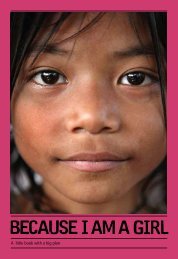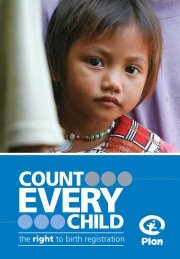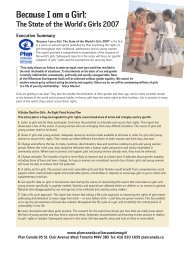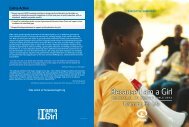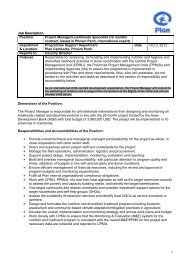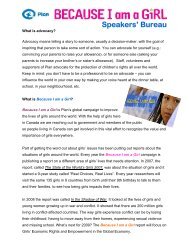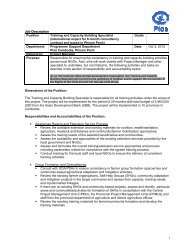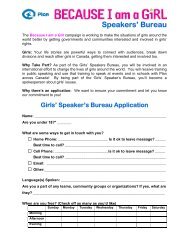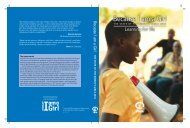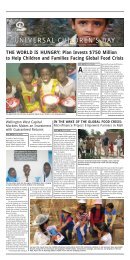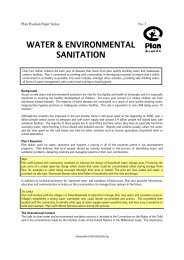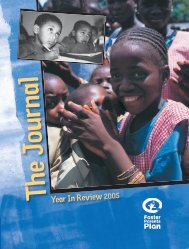Plan Worldwide Annual Review and Combined Financial ...
Plan Worldwide Annual Review and Combined Financial ...
Plan Worldwide Annual Review and Combined Financial ...
You also want an ePaper? Increase the reach of your titles
YUMPU automatically turns print PDFs into web optimized ePapers that Google loves.
How we work<br />
<strong>Plan</strong> sees a clear link between access to rights <strong>and</strong> poverty.<br />
The poorest <strong>and</strong> most vulnerable children are deprived of basic<br />
rights to health, education <strong>and</strong> protection. Children who have a<br />
healthy start in life <strong>and</strong> a quality education <strong>and</strong> are supported to<br />
play an active role in their own development have a much better<br />
chance of becoming economically secure adults, benefiting future<br />
generations <strong>and</strong> contributing to their countries’ economic growth.<br />
<strong>Plan</strong> believes that young people should have the chance to<br />
play an active role in setting priorities, developing strategies,<br />
assessing local progress, preparing for disasters, <strong>and</strong> taking part<br />
in decisions that affect their communities. All these activities can<br />
help build their confidence <strong>and</strong> skills <strong>and</strong> enable them to become<br />
active citizens.<br />
Our child-centred community development approach is firmly<br />
based on the concepts of child rights, principles of inclusion<br />
<strong>and</strong> non-discrimination <strong>and</strong> participation. We work with<br />
children, communities <strong>and</strong> other key partners, such as local<br />
organisations, national networks <strong>and</strong> government agencies.<br />
Key features of our work include:<br />
• working closely with children <strong>and</strong> their families<br />
in the communities where they live<br />
• working with local <strong>and</strong> national government<br />
to hold them to account <strong>and</strong> support them to<br />
meet their obligations towards child rights<br />
• partnerships with a range of civil society<br />
organisations to strengthen their capacity<br />
<strong>and</strong> to implement programmes<br />
• engaging with corporations in socially<br />
responsible programmes<br />
• working within coalitions <strong>and</strong> alliances to<br />
tackle the underlying causes of poverty<br />
through advocacy <strong>and</strong> campaigns on<br />
child rights.<br />
<strong>Plan</strong>’s work covers eight programme areas addressing<br />
children’s rights to:<br />
1 a quality education (see page 16)<br />
2 a healthy start in life (see page 18)<br />
3 grow up safely in communities that are resilient<br />
to disasters, <strong>and</strong> have their rights protected<br />
during emergencies (see page 20)<br />
4 participate as citizens (see page 22)<br />
5 protection from all forms of abuse, neglect,<br />
exploitation <strong>and</strong> violence (see page 24)<br />
6 economic security (see page 26)<br />
7 sexual <strong>and</strong> reproductive health, including<br />
HIV prevention, care <strong>and</strong> treatment (see page 28)<br />
8 a safe, consistent supply of drinking water<br />
<strong>and</strong> improved sanitation (see page 29).<br />
ABOUT PLAN<br />
© Niels Busch © <strong>Plan</strong> / Rene Gonzalez<br />
7



